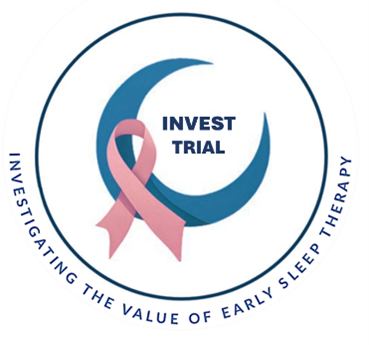
INvestigating the Value of Early Sleep Therapy (INVEST)
The INVEST trial aims to explore the feasibility, acceptability, and early efficacy of a behavioural treatment for insomnia, in people with breast cancer. This pilot-RCT is currently recruiting participants from sites throughout Scotland.
Funder: Chief Scientist Office (CSO)
Project Duration: 2-years
Principal Investigator: Professor Leanne Fleming
Research Team: Leanne Fleming1, Declan M. McLaren1, Solveiga Zibaite1, Simon D. Kyle2, Kathleen Boyd3, Vivien Green4, James Mansell5, Beatrix Elsberger6, David Young7.
Institutional details
1 – Department of Psychological Sciences and Health, University of Strathclyde, Glasgow.
2 – Sleep & Circadian Neuroscience Institute, Nuffield Department of Clinical Neurosciences, University of Oxford, Oxford.
3 – Health Economics and Health Technology Assessment Unit, Institute of Health & Wellbeing, University of Glasgow, Glasgow.
4 – PPI Representative, Linlithgow.
5 – NHS Greater Glasgow & Clyde, Glasgow.
6 – NHS Grampian, Breast Unit, Aberdeen Royal Infirmary, Aberdeen.
7 – Department of Mathematics and Statistics, University of Strathclyde, Glasgow.
Summary
Approximately half of all people diagnosed with breast cancer will meet criteria for acute insomnia. For many, this sleep disturbance persists, becoming chronic, at which point it is unlikely to resolve without intervention. Impaired sleep can be deleterious to physical and psychological health, and is associated with poorer cancer outcomes. Thus, investigation of acceptable and effective interventions is clearly indicated.
People with insomnia commonly engage in maladaptive behaviours to try and mitigate the effects of poor sleep, such as napping through the day, or elongating the time spent in bed; behaviours which are known to contribute towards the development of chronic insomnia disorder. Sleep Restriction Therapy (SRT) is an effective and tolerable treatment for insomnia, which aims to stabilise the sleep/wake cycle by exploiting the body’s natural drive for sleep and encouraging behaviour change. Though well-evidenced in many clinical populations, SRT has never been examined in people with early signs of sleep disturbance throughout treatment for breast cancer.
The INVEST trial seeks to recruit 50 participants recently diagnosed with non-metastatic breast cancer, meeting criteria for acute insomnia. Participants will be recruited throughout Scotland, from NHS sites (NHS Grampian and NHS Greater Glasgow & Clyde) or via third sector organisations which comprise routine cancer care. Participants will be block randomised (1:1) to receive SRT via four weekly sessions, or sleep hygiene education (SHE) in booklet form. Outcomes will assess treatment feasibility, acceptability, sleep, and mental health, at baseline, post-treatment, and a 12-week follow up. This will allow us to determine how feasible and acceptable SRT is to patients, and to plan for a future, larger study.
PLOS ONE Protocol: Insomnia prehabilitation in newly diagnosed
breast cancer patients
To find out more, please contact declan.mclaren@strath.ac.uk.
Strathclyde Sleep Centre
Proudly powered by WordPress